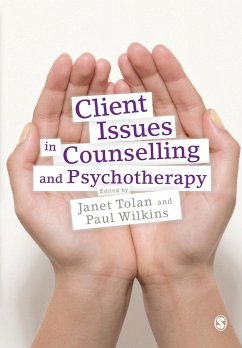This is the first book to focus on commonly occurring client issues and explore how to work with them from a person-centred perspective. Extensive case studies translate person-centred theory into effective practice, enabling therapists to work successfully with clients presenting a variety of different problems including:
-Post Traumatic Stress
-Depression
-Panic and Anxiety
-Drug and Alcohol Issues
-Eating difficulties
-Self harm
-Childhood Sexual Abuse
Each chapter covers the origin and meaning of the difficulty, the person-centred therapeutic approach and process, and the outcomes. Drawing from a combined 50 years of experience in the field, Paul Wilkins and Janet Tolan bring together leading person-centred therapists to address how and why each problem can be eased by means of working with the person.
This book should be on the desk of every counselling and psychotherapy trainee, and is recommended reading for other practitioners of health and social care working with these client groups.
-Post Traumatic Stress
-Depression
-Panic and Anxiety
-Drug and Alcohol Issues
-Eating difficulties
-Self harm
-Childhood Sexual Abuse
Each chapter covers the origin and meaning of the difficulty, the person-centred therapeutic approach and process, and the outcomes. Drawing from a combined 50 years of experience in the field, Paul Wilkins and Janet Tolan bring together leading person-centred therapists to address how and why each problem can be eased by means of working with the person.
This book should be on the desk of every counselling and psychotherapy trainee, and is recommended reading for other practitioners of health and social care working with these client groups.
'This book is a valuable addition to the literature on person-centred therapy (PCT), dealing as it does with the thornier questions that unsettle every person-centred therapist at some stage in their practice...Written by seasoned practitioners who draw on their experience to illustrate how theory informs the decisions they make in response to dilemmas. As might be expected from person-centred practitioners, the book offers a range of interpretations of theory, reflecting what each author considers to be essentially person-centred. One of the most thought-provoking chapters for me is by Rose Cameron, on self-injury, which takes in new developments in neurobiology...This is an important book, not only for students of the person-centred approach but also for those hungry for a fresh perspective from throughtful practitioners' -
Therapy Today
Therapy Today

